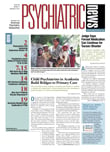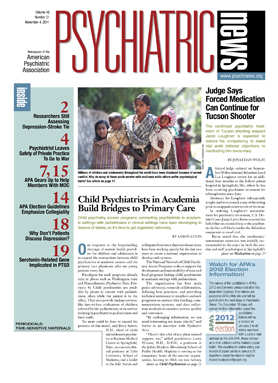Uninsurance rates among nonelderly adults with frequent mental distress are disproportionately high, according to survey results reported in the October Psychiatric Services.
After adjusting for sociodemographic characteristics, uninsurance among adults aged 18 to 64 was markedly higher among those with frequent mental distress—either alone or in combination with frequent physical distress—than among those with frequent physical distress alone.
"Inasmuch as self-report of mental distress can be seen as a proxy for having a diagnosis of a mental illness, the survey shows that many of the people who might need insurance the most are those who are least likely to have it," coauthor Benjamin Druss, M.D., told Psychiatric News.
Druss is the Carter Chair in Mental Health in the Department of Health Policy and Management at the Rollins School of Public Health at Emory University in Atlanta.
The data were derived from the 1993 through 2009 Behavioral Risk Factor Surveillance System (BRFSS), an annual state-based surveillance system operated by state health departments in collaboration with the federal Centers for Disease Control and Prevention (CDC). The system uses random-digit dialing to develop the survey sample.
Beginning in 1993, questions about mentally and physically unhealthy days were included in the BRFSS. Two questions involved respondents' self-assessment of their health over the previous 30 days. "How many days was your physical health, which includes physical illness or injury, not good?" assesses physically unhealthy days. "How many days was your mental health, which includes stress, depression, and problems with emotions, not good?" determines how respondents' assess their mental health.
According to the study, these questions have demonstrated validity and reliability for population health surveillance by two CDC analyses published in the journal Health and Quality of Life Outcomes and in a study of retest reliability published in the journal Health and Quality of Life Outcomes.
The researchers categorized mentally and physically unhealthy days as indicating either infrequent distress (zero to 13 days) or frequent distress (14 to 30 days). Data, including information about insurance status and physically and mentally unhealthy days, were available for more than 2.8 million respondents.
Overall, from 1993 to 2009, after adjustment for sex, age, race, ethnicity, and educational attainment, nonelderly adults with neither frequent mental distress nor frequent physical distress were least likely to be uninsured (16.6 percent), followed by those with frequent physical distress only (17.7 percent), those with both frequent mental distress and frequent physical distress (21.8 percent), and those with frequent mental distress only (22.6 percent).
Druss and his colleagues suggested that the results can be used as a baseline for assessing whether implementation of the Patient Protection and Affordable Care Act—the 2010 health care reform law—is accompanied by changes in health care access, utilization, and self-reported measures of health among those with mental illness.
"The health reform law is largely about expansion of insurance, so coupled with parity there should be an extension of coverage for those with mental disorders," Druss said.

